Key takeaways:
- Noise control engineering intertwines acoustics, engineering, and environmental science, emphasizing the necessity of understanding sound behavior for effective solutions.
- Selecting reliable suppliers is vital for achieving quality results and can significantly impact project timelines and budgets.
- Key criteria for choosing suppliers include quality assurance, responsiveness, and a proven track record in similar projects.
- Personal experiences highlight the importance of open communication, shared values, and proactive support in fostering successful supplier relationships.
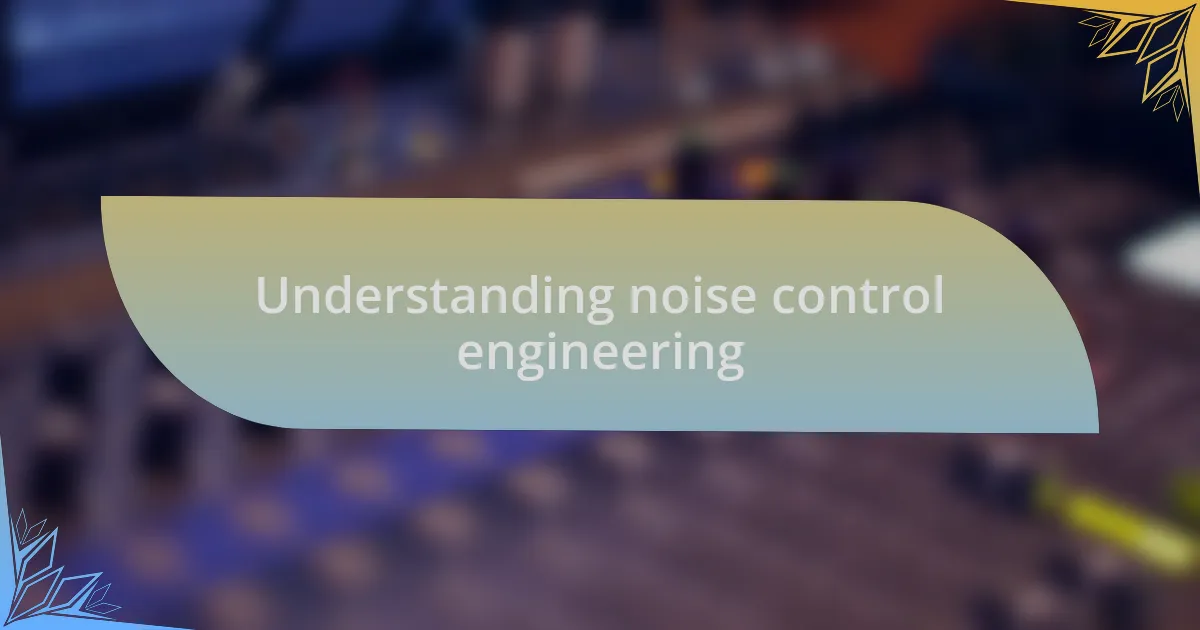
Understanding noise control engineering
Noise control engineering is a fascinating field that combines principles from acoustics, engineering, and environmental science to address sound-related challenges. I remember the first time I understood the impact of noise pollution—it was during a community meeting where residents voiced their concerns about a nearby construction project. This experience really drove home the idea that noise isn’t just a nuisance; it can have significant effects on health and well-being.
One of the key aspects of noise control engineering is understanding how sound behaves in different environments. Have you ever walked into a room and felt the sound bounce off the walls? That’s an example of acoustics in action, and it plays a critical role in designing spaces that minimize unwanted noise. When I worked on a project to mute a commercial space, I discovered that simple adjustments, like adding sound-absorbing materials, drastically improved comfort and productivity.
Moreover, selecting the right solutions goes beyond just materials; it involves carefully analyzing the specific noise sources and their frequencies. I found that using tools like sound level meters can be a game-changer. Seeing the data on those screens can be quite enlightening. It makes you ponder, how often do we really consider the soundscape around us? Understanding noise control engineering allows us to create better environments for living and working.
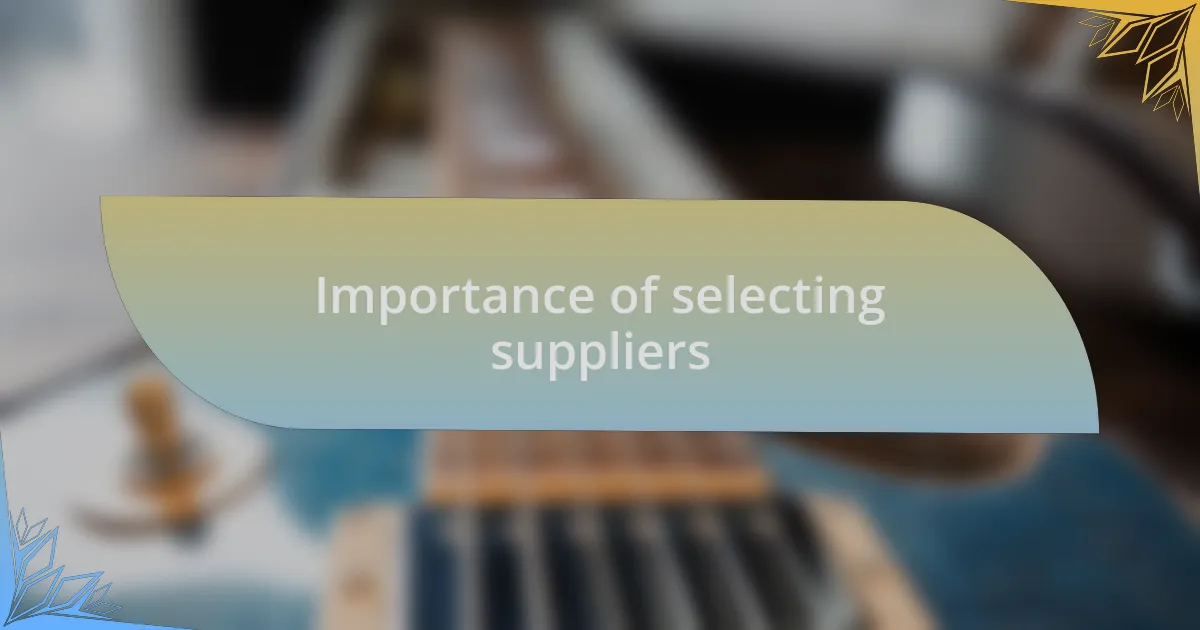
Importance of selecting suppliers
Selecting the right suppliers is crucial because they directly impact the quality of the materials and services we rely on in noise control engineering. I recall a time when I chose a supplier whose sound-absorbing panels were subpar; the project suffered because the expected noise reduction wasn’t achieved. That experience taught me that a reliable supplier goes beyond just providing products; they should also offer expertise and support throughout the process.
Another factor to consider is that suppliers can influence our timeline and budget. I remember a project where delays in material delivery led to a domino effect, pushing back the entire schedule. When I evaluated suppliers, I realized that those who communicated openly about lead times and potential issues were apparent choices. It made me wonder: how do we gauge reliability beyond price?
Additionally, the relationship with suppliers can foster collaboration and innovation. I once partnered with a supplier who was eager to share the latest advancements in noise control technologies. Their insights not only enhanced my understanding but also allowed us to implement more effective solutions for our clients. In a field where every sound wave matters, having suppliers who are aligned with our values and goals is an invaluable asset.
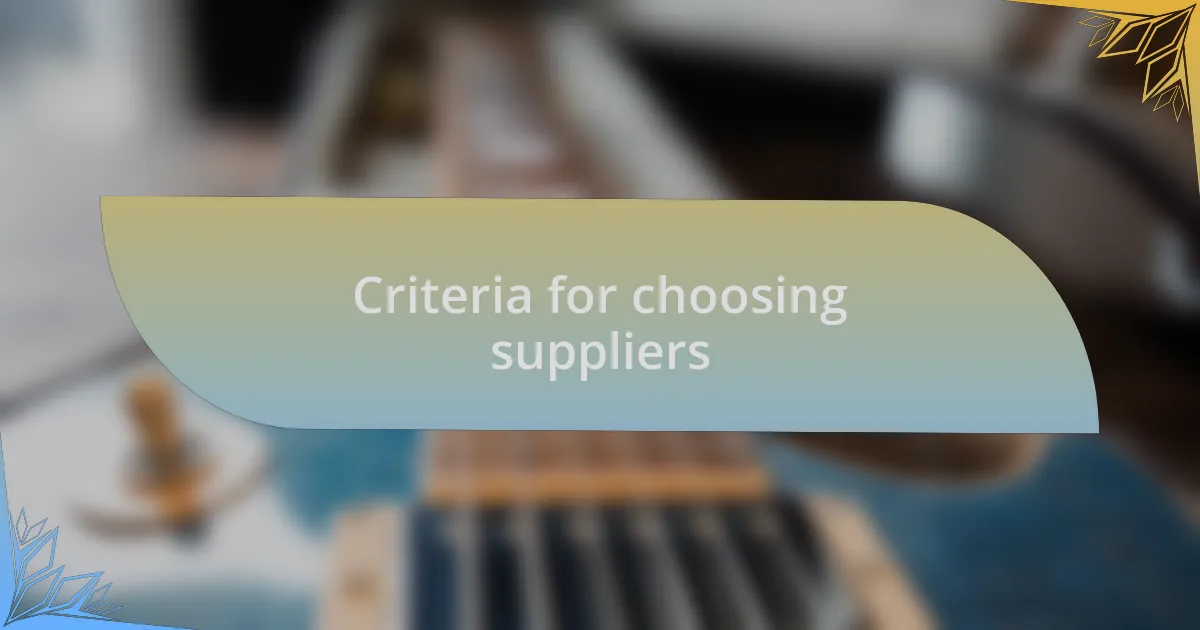
Criteria for choosing suppliers
When selecting suppliers, I prioritize quality assurance as a key criterion. I vividly remember sourcing materials for a high-stakes project, and I discovered that a supplier’s adherence to industry standards made all the difference. It made me wonder, how can we be sure that what we’re receiving will meet our rigorous requirements? I found that asking for certifications and quality control processes was essential in ensuring reliability.
Another important aspect is responsiveness to inquiries and support during the selection process. I once reached out to a potential supplier with several questions about their products, and the speed and depth of their responses revealed a lot about their customer service. This experience led me to realize that suppliers who are accessible and willing to engage typically reflect the level of support I can expect during our partnership. It’s comforting to have a supplier who stands by their offerings and addresses any concerns promptly.
Lastly, assessing the supplier’s track record with similar projects plays a critical role in my decision-making. I recall checking testimonials and past projects of a supplier I was considering—seeing real-world applications of their materials provided peace of mind. It sparked a thought: how can we trust a supplier if they lack a proven history in our specific niche? Having evidence of success in noise control gives not just confidence, but also a strong sense of security that the project will meet its objectives.
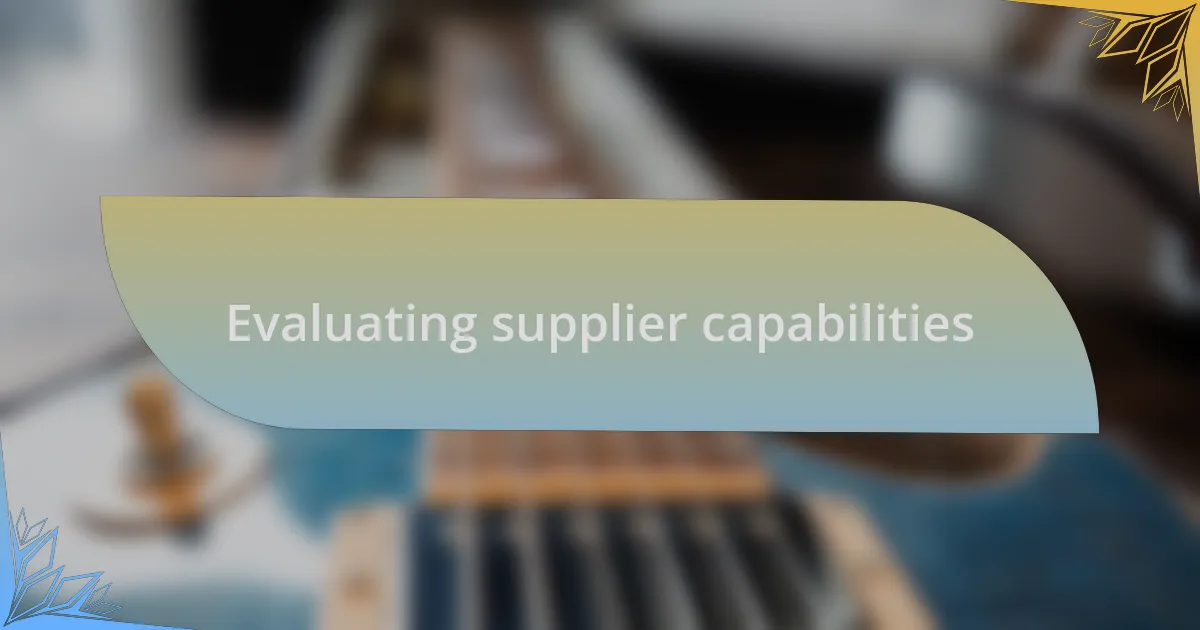
Evaluating supplier capabilities
When evaluating supplier capabilities, I focus heavily on their technical expertise. I remember a time when I was evaluating a prospective partner for sound insulation materials. Their team discussed not only the products but also shared in-depth knowledge about acoustic performance metrics. This conversation made me ask myself, “Are they just selling products, or do they genuinely understand how these materials function in real-world applications?” I realized that a supplier’s expertise can directly influence the effectiveness of noise control solutions.
Another critical element is the supplier’s production capacity. I once encountered a situation where a highly recommended supplier was unable to meet our order volume due to limitations in their manufacturing process. It made me reflect on the importance of scalability: “What happens if my project grows and I need more resources?” Knowledge of a supplier’s capability to ramp up production without sacrificing quality is vital for maintaining project timelines and budgets.
Lastly, their innovation and commitment to improvement can significantly sway my decision. When I learned that one supplier invested in new technology to enhance their product line, I felt an immediate connection. It raised the question in my mind: “Are they looking for ways to stay ahead in the industry?” A supplier that prioritizes innovation often indicates a forward-thinking approach that can benefit our projects in the long run.
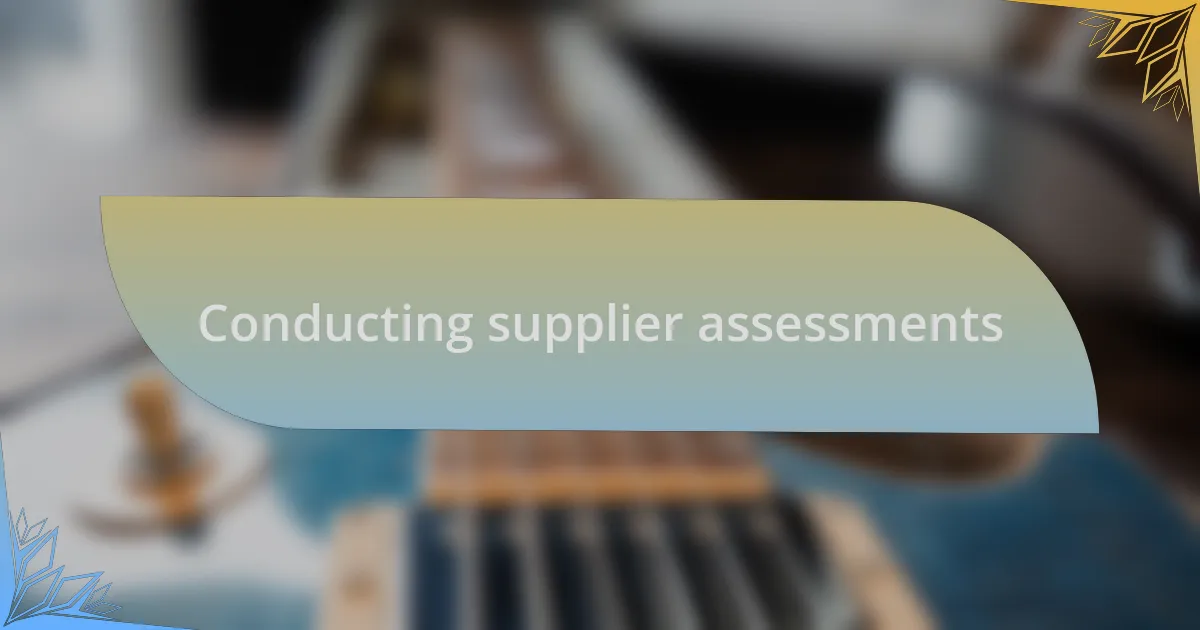
Conducting supplier assessments
When conducting supplier assessments, I always start by looking for references from past clients. I recall once reaching out to a previous buyer of a potential supplier, and their feedback was eye-opening. They described not only the product quality but also the supplier’s responsiveness during the project. It made me reflect: “How reliable is this supplier when things don’t go as planned?” Assessing past experiences can help me gauge whether the supplier is truly dependable.
Another crucial aspect is the alignment of values, which I often find overlooked. I experienced this firsthand when I partnered with a supplier who emphasized sustainability. Their commitment to eco-friendly practices resonated with my own values, and I thought: “Do I want to work with a partner who shares my vision for a greener future?” This alignment fosters a more collaborative relationship, ensuring we both prioritize the same goals throughout our projects.
Lastly, I take a close look at their customer service capabilities. There was a time when a small glitch in our order demanded immediate attention. The way the supplier handled it spoke volumes about their commitment to customer satisfaction. I couldn’t help but wonder, “How will they support me when I face challenges?” Effective communication and a responsive attitude can make a significant difference in the success of any project, especially in the dynamic field of noise control engineering.
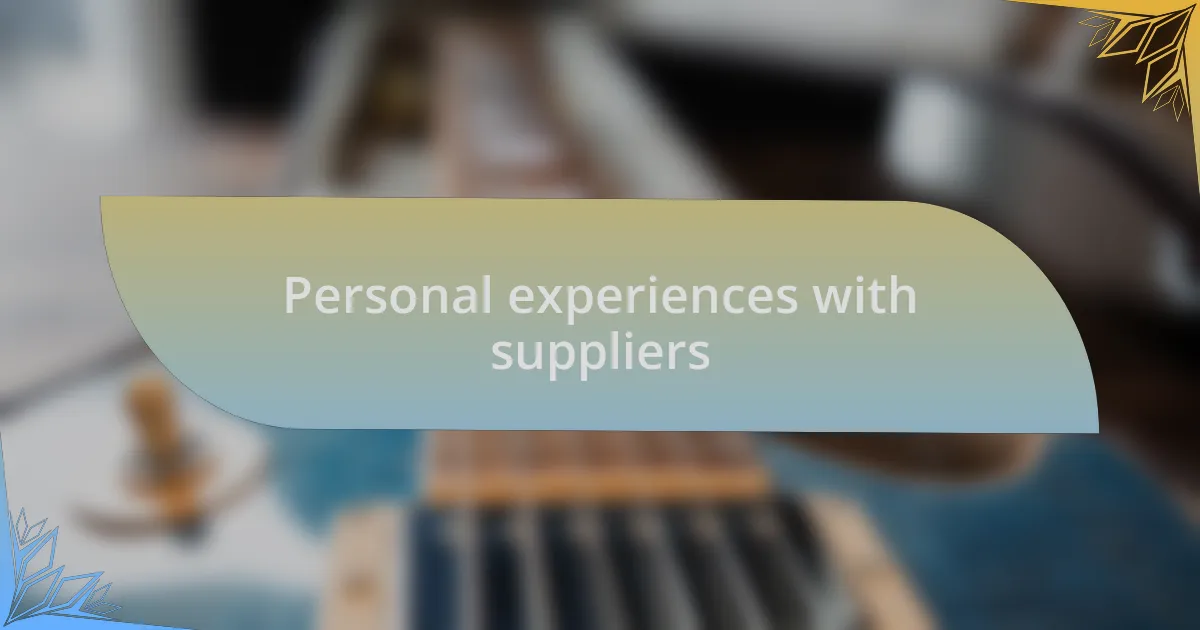
Personal experiences with suppliers
Selecting the right suppliers has been a journey filled with memorable experiences. I recall an instance where I met a supplier at a trade show who sparked my interest with their innovative noise-mitigation products. As we chatted, I felt a genuine connection; it was refreshing to see a supplier excited about their work. I wondered, “Do they genuinely care about the problems I’m trying to solve?” This encounter not only led me to a dependable partner but also sparked numerous successful projects, reinforcing the idea that personal rapport can enhance collaboration.
There was another time when I faced delays with a supplier, and the situation was tense. I reached out, fully expecting pushback on their end. Instead, I was met with empathy and transparency. This supplier explained the hiccup and worked tirelessly to expedite a solution. It made me think, “How crucial is it to have a supplier who can openly communicate during tough times?” That experience taught me the value of patience and understanding in supplier relationships and highlighted the importance of open lines of communication.
Finally, I remember a project where I had to pivot quickly due to unexpected regulations. My supplier came through with a wealth of knowledge about compliance measures. Their ability to adapt and offer solutions not only saved the day but reinforced my belief: “Isn’t it invaluable to have a supplier who can think on their feet?” This experience showed me that the right suppliers do more than provide products; they become partners in navigating the complexities of our projects in noise control engineering.

Lessons learned in supplier selection
One lesson I learned in supplier selection is the immense value of aligning visions and goals. I once partnered with a supplier whose focus was primarily on cost-cutting, while my priority was on quality and innovation. As we moved further into the project, I realized our differing objectives created friction. It led me to ask myself, “How crucial is it to find a supplier who shares your commitment to excellence?” This experience highlighted that alignment goes beyond pricing; it’s about shared values that drive successful outcomes.
Trust is another vital component in the supplier relationship. In an instance where I relied on a supplier’s timeline, unforeseen complications arose. I felt a mix of anxiety and frustration when deadlines slipped. However, their proactive updates helped ease my concerns. I found myself reflecting, “Isn’t peace of mind invaluable in such situations?” This taught me that a trustworthy supplier not only communicates openly but also takes responsibility, fostering a partnership where we can both thrive amid challenges.
Lastly, I discovered the importance of thorough vetting in the selection process. I once hastily engaged with a supplier based on a promising pitch but soon found their deliverables lacking. The disappointment left me pondering, “What if I had asked more questions upfront?” This taught me to dig deeper into past performances and seek feedback from other clients. It’s a reminder that due diligence can prevent costly missteps and lead to stronger, more reliable partnerships in the long run.